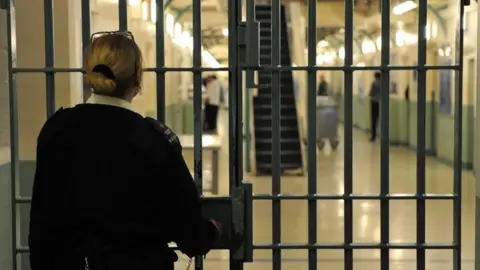Plan to extend early prisoner release scheme
 BBC
BBCThe government is planning to extend a scheme which allows some prisoners to be freed early to ease pressures in jails across England and Wales.
Under the programme, certain inmates jailed for less than four years can be let out before the halfway point of their sentence.
They are made to wear an electronic tag and abide by a curfew.
Ministers want to increase the maximum period for which they can be released from four-and-a-half to six months.
An official estimate, carried out last year, said it would lead to a "spike" of about 600 in the number of prisoners who are freed early.
Last Friday, 2,718 prisoners were on the scheme, which is known as home detention curfew (HDC).
The timing of the announcement is likely to fuel speculation that it is linked to fears of a possible outbreak of coronavirus in prisons, but sources insisted the two were not connected and it was instead related to wider capacity concerns.
The prison population stands at 83,917, which is 1,431 more than 12 months ago, and is expected to increase further due to sentencing changes and the recruitment of 20,000 extra police officers.
The HDC changes were presented to MPs on Monday and will require parliamentary approval.
They were first put forward in July 2019 when David Gauke was justice secretary but were dropped as Boris Johnson prepared to take over as prime minister.
A Ministry of Justice "impact assessment", published last July and signed by Robert Buckland, who was prisons minister before succeeding Mr Gauke, said the aim was to better manage the release of prisoners and prepare them for supervision in the community.
The document said changes to the scheme would also "reduce the prison population by allowing suitable offenders to be managed in the community rather than in custody for up to six weeks (45 days) longer".
It said: "This will contribute to improving prison conditions and enable prisoners to feel safer, calmer and readier to engage in their rehabilitation.
"A reduction in prison population may also contribute to making them safer places for staff and other offenders."
'Strict conditions'
The planned changes to the HDC scheme will not affect the category of prisoner who is eligible for early release.
HDC does not apply to offenders serving four or more years in jail or less than 12 weeks, those liable to deportation and registered sex offenders.
A number of other prisoners are also considered unsuitable including people convicted of terror-related offences and cruelty to children.
A Ministry of Justice spokesperson said the government had been clear serious offenders should stay in prison for longer and public protection was its "top priority".
However, the spokesperson added: "Any effective justice system must also rehabilitate whenever possible and Home Detention Curfew allows carefully assessed offenders, who committed less serious crimes, to begin their reintegration back into the community.
"They remain subject to strict conditions, including electronic tags, and can be returned to custody if they fail to comply with any of these."